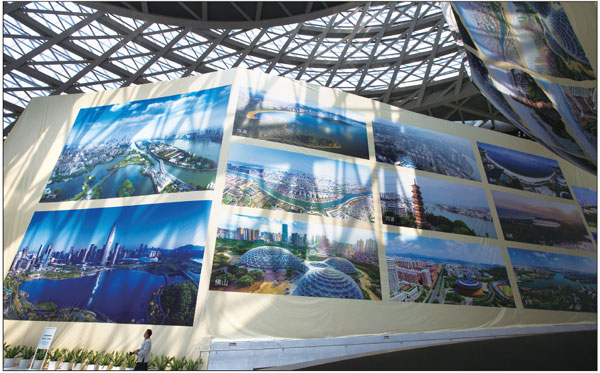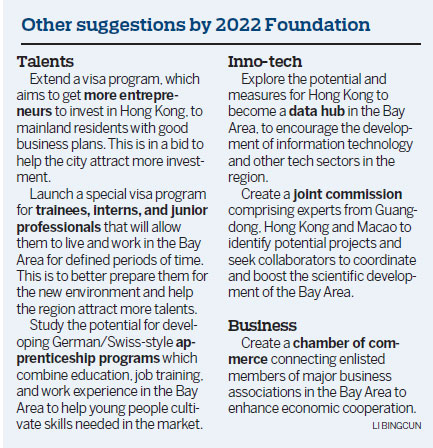Experts call for 'internationalization incubators' to push Bay Area forward
A proposal to set up "internationalization incubators" in Hong Kong and Macao for Guangdong companies to explore overseas markets will create mutual benefits, experts and professionals said on Friday.
They made the remarks in response to a report released by 2022 Foundation on Friday, which suggests developing "internationalization incubators" in the two special administrative regions to help Guangdong firms planning to "go abroad".
In forming the report titled "Creating the Greater Bay Area of the Future - Opportunities for Hong Kong", the non-profit organization, chaired by Victor Fung Kwok-king, engaged economists from Hong Kong, Guangdong and Europe in May last year to undertake a study on the Guangdong-Hong Kong-Macao Greater Bay Area and provided about 50 suggestions.
It included a chapter on enhancing business cooperation, which suggests setting up Bay Area internationalization platforms in Hong Kong and Macao.
It found that there is a growing demand from companies in Guangdong to operate in international markets. But most of them lack knowledge and experience in dealing with this matter.
Although Hong Kong and Macao, both having close international links, can offer help, many companies believe it is difficult to use the two SARs as platforms. This is because many private companies are not familiar with the necessary procedures.
The idea of "internationalization incubators" was developed to solve this issue. The incubators will connect companies' offices in the Bay Area with internationalization support service providers such as lawyers, accountants, consultants, and other business professionals, as well as relevant government agencies, the report said.
This would "dramatically" help mainland companies in the Bay Area to use Hong Kong and Macao as their internationalization bases, it added.
It will bring two-way benefits, said Edward Cheng Wei-sun, deputy chairman and CEO of Wing Tai Properties, who is also a member of Chief Executive's Council of Advisers on Innovation and Strategic Development.
He believes that Hong Kong is no longer necessarily leading the Bay Area - as all the 11 cities have special skills.
"Hong Kong definitely can participate in these kinds of collaboration and partnership to offer these services to other Bay Area cities. The more successful we do this in the Bay Area, the more benefits we will generate for Hong Kong," Cheng said. "It is interactive."
Similarly, the development blueprint issued by the State Council in February also vowed to develop a host of incubators. But these are Hong Kong and Macao-oriented and for technology enterprises in the nine Pearl River Delta cities.
These incubators are expected to provide convenience to higher education institutions and research and development institutes in Hong Kong and Macao to transfer and apply their advanced technological achievements.
Contact the writers atsally@chinadailyhk.com


All rights reserved. Presented by China Daily









